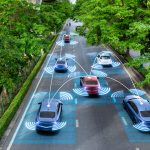Will I Be Servicing Driverless Cars in the Future?
I’m very happy to be a mobile mechanic for cars and vans, but I’m becoming increasingly aware that I need to develop skills to cope with cars of the future. Like many people, I had assumed that fully automated cars were decades away. Until now. Our society has been pushed into unchartered territory by the Coronavirus pandemic and we are experiencing change on a rapid scale. Millions of people who were chained to the 9 to 5 commute and an office lifestyle are now working from home. Companies are likely to downsize their office space and reap the savings. Online shopping is becoming ever more popular to the detriment of traditional retail – perhaps accelerating the decline of the high street by as much as five years. Deliveries of food to the door, whether shopping or takeaways, has become the new normal for many households. Therefore, to imagine automated vehicles being used for deliveries in a few years really doesn’t feel far-fetched. Imagine how much faster deliveries could be made if the vehicles were pre-programmed with destinations and the ‘controller’ merely hopped in and out with the packages!
Companies including Tesla, Audi, Volvo, Google and Apple are in a race to produce the first driverless vehicles. Testing in public is already underway, with mixed success. Currently, autonomous cars are loaded with sensors and computers which process information about the vehicle’s surroundings. They also have a steering wheel and pedals, so that an onboard technician can regain manual control if required.
The final stage of autonomous cars is for them to be wirelessly connected to one another and to communicate with the road infrastructure to make decisions on traffic and journey times. No “live” input from a passenger or a technician required.
It’s likely that the first truly driverless vehicle on our streets will be rolled out by an app such as Uber, allowing passengers to travel in a taxi without a driver. A year ago, motoring magazines were predicting that driverless taxis would exist by 2024. Thanks to Coronavirus, the demand and urgency for driverless vehicles has undoubtably increased, albeit unconsciously for some of us. No driver equals less risk of virus transmission.
However, development is costly, and legislation isn’t in place for driverless cars to fill the roads alongside traditional vehicles. Who would we blame if a driverless car caused an accident? The app which controls it, or the manufacturer? Will insurance companies welcome driverless cars, or will the cost of insuring one be so prohibitive that it prevents widescale adoption by the public?
Which country will embrace them first? Japan and South Korea spring to mind, but most of the technological development is being funded in the UK and USA.
I’m confident that we’ll see driverless cars on the roads in Wales within 10 years. I’d like to think that I’ll be suitably qualified to service them, but in reality it’s more likely that an IT graduate will respond when you type “mobile car mechanics near me” into your smart phone.












Leave a Reply:
You must be logged in to post a comment.